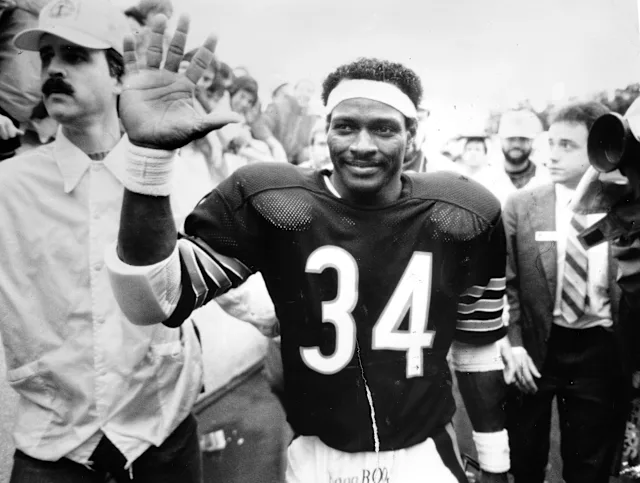Walter Payton, affectionately known as “Sweetness,” was one of the most legendary figures in National Football League (NFL) history. Celebrated for his extraordinary talent, relentless determination, and generosity, Payton became an icon both on and off the field. His legacy continues to inspire generations of athletes, blending athletic greatness with a deep commitment to community service.
Born on July 25, 1953, in Columbia, Mississippi, Payton rose to prominence as one of the greatest running backs the NFL has ever seen. Over his remarkable 13-season career with the Chicago Bears, he broke numerous records, won a Super Bowl, and earned a place among football’s immortals. Even decades after his passing, his influence endures through the Walter Payton Man of the Year Award—a symbol of excellence and compassion.
Quick Facts of Walter Payton
| Attribute | Details |
|---|---|
| Full Name | Walter Jerry Payton |
| Date of Birth | July 25, 1953 |
| Place of Birth | Columbia, Mississippi, USA |
| Nationality | American |
| Family Background | Son of Peter and Alyne Payton; two siblings |
| Education | Jackson State University |
| Career Beginnings | Drafted by the Chicago Bears in 1975 |
| Major Achievements | NFL MVP (1977), Super Bowl XX Champion, Hall of Fame (1993) |
| Relationship Status | Married |
| Spouse | Connie Norwood (m. 1976) |
| Children | Jarrett Payton, Brittney Payton |
| Net Worth | Estimated at $3 million (as of 1999) |
Early Life and Family Background
Walter Payton grew up in a modest but hardworking family in Columbia, Mississippi. His father, Peter Payton, worked in a factory and played semi-professional baseball, while his mother, Alyne, nurtured the family’s values of perseverance and faith. These early lessons shaped Walter’s character and fueled his lifelong drive for excellence.
As a child, Payton was deeply involved in various activities. He joined the Boy Scouts, played Little League baseball, and performed in his church choir. Interestingly, he initially avoided football to let his older brother, Eddie, enjoy the spotlight. However, after Eddie graduated, Walter joined the football team and immediately made an impact. His speed, agility, and determination quickly turned him into a standout athlete. Beyond football, he also excelled in track and basketball, showcasing a rare all-around athletic ability.
Career Beginnings and Key Milestones
After high school, Payton attended Jackson State University, where his football career truly took off. Known for his electrifying runs and unmatched determination, he earned the nickname “Sweetness.” His college success caught national attention, setting the stage for his professional journey.
In 1975, the Chicago Bears selected Payton as the fourth overall pick in the NFL Draft. He quickly became the cornerstone of the team’s offense. His breakout season came in 1977, when he earned the NFL’s Most Valuable Player award after leading the league in rushing yards and touchdowns. That same year, he set an NFL record with 275 rushing yards in a single game against the Minnesota Vikings—remarkably, while battling the flu.
Throughout his 13-year career, Payton was known not only for his records but also for his leadership. He helped transform the Bears into championship contenders and ultimately led them to victory in Super Bowl XX in 1986. His tireless running style, powerful stiff arms, and graceful balance made him one of the most complete running backs in history.
Notable Works and Achievements
Walter Payton’s accolades are nearly unmatched in football history. Over his career, he earned:
- 9× Pro Bowl selections
- NFL MVP (1977)
- Super Bowl XX Champion (1986)
- Pro Football Hall of Fame inductee (1993)
By the time he retired, Payton held multiple NFL records, including most career rushing yards (16,726), rushing touchdowns (110), and all-purpose yards (21,803). His legacy extended beyond statistics—his sportsmanship, humility, and commitment to excellence made him a true ambassador of the game.
Personal Life and Relationships
In 1976, Payton married his high school sweetheart, Connie Norwood. Together, they raised two children, Jarrett and Brittney Payton. Connie was a pillar of strength throughout his life, particularly during his health challenges later on.
Jarrett followed his father’s footsteps into football, playing professionally before moving into broadcasting. Brittney became a TV host and philanthropist, continuing the family’s tradition of giving back to the community.
Despite his fame, Payton valued privacy and family time. He was often described as humble and kind—a man who treated everyone with respect, regardless of their status.
Net Worth and Lifestyle
At the time of his passing in 1999, Walter Payton’s net worth was estimated at $3 million. Most of his wealth came from his NFL salary, endorsements, and post-retirement business ventures. Payton invested in restaurants, real estate, and auto dealerships, and even co-owned Payton-Coyne Racing, reflecting his interest in motorsports.
Despite his financial success, Payton led a modest and grounded lifestyle. He believed in using his platform to uplift others, which became evident through his charitable foundation and ongoing community efforts.
Interesting Facts and Trivia
- Payton earned the nickname “Sweetness” for his smooth running style and kind personality.
- He never ran out of bounds—preferring to face defenders head-on.
- He was also a talented musician, playing drums and singing in his youth.
- The NFL Man of the Year Award was renamed in his honor, becoming the Walter Payton NFL Man of the Year Award.
- He co-authored the inspirational autobiography Never Die Easy, which captured his life philosophy and perseverance.
Charitable Work and Legacy
Walter Payton’s impact off the field was equally remarkable. He established the Walter Payton Foundation, which continues to help underprivileged children through education, mentorship, and career development. His humanitarian efforts earned him admiration far beyond sports.
Today, his name lives on through the Walter Payton NFL Man of the Year Award, celebrating players who excel in both athletic achievement and community service. Additionally, his statue at Soldier Field stands as a lasting tribute to his unmatched contributions to football and humanity.
Cultural Impact and Enduring Legacy
Though Walter Payton passed away in 1999, his legacy remains timeless. His work ethic, humility, and compassion continue to influence athletes and fans across the globe. Documentaries, biographies, and annual tributes keep his memory alive, ensuring future generations recognize the greatness of “Sweetness.”
Walter Payton was more than an athlete—he was a symbol of determination, integrity, and kindness. His legacy transcends the game, serving as a reminder that true greatness is measured not only by achievements but by the positive impact one leaves behind.








